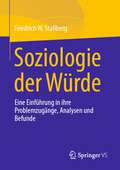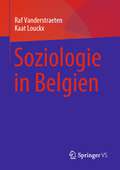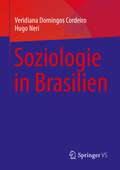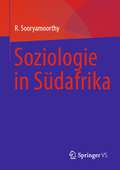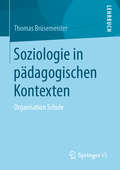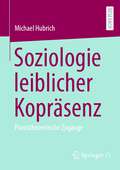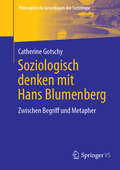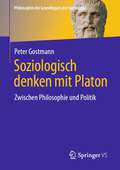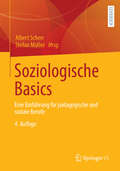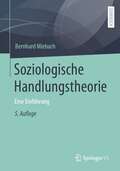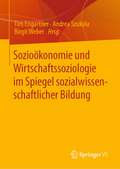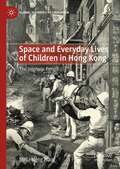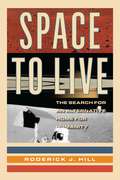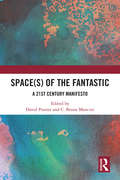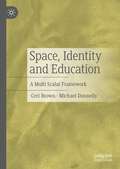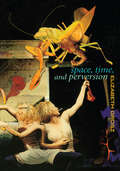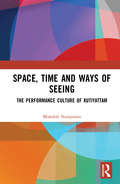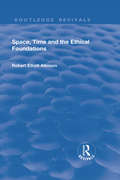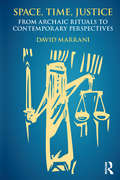- Table View
- List View
Soziologie der Würde: Eine Einführung in ihre Problemzugänge, Analysen und Befunde
by Friedrich W. StallbergDieses Studienbuch bietet eine soziologische Einführung in die konfliktreiche Welt der Menschenwürde. In Abgrenzung zum vorherrschenden normativen Verständnis von Würde wird diese als eine Achtung und Autonomie anstrebende individuelle Handlungsorientierung beschrieben, die interaktiv und institutionell geformt ist, und deren Erfolgschancen von den umfassenden gesellschaftlichen Verhältnissen abhängen. Da sich Würde im Alltag erst in Situationen der Bedrohtheit und Beschädigung als für Lebensführung und Identität unentbehrlich zu erkennen gibt, konzentriert sich auch die Darstellung ihrer Realität auf Risiken, Formen und zentrale Schauplätze ihrer Beeinträchtigung.
Soziologie in Belgien
by Raf Vanderstraeten Kaat LouckxDieses Buch bietet eine historisch-soziologische Analyse der Geschichte der Soziologie in Belgien vom späten neunzehnten bis zum frühen einundzwanzigsten Jahrhundert. Es wirft ein neues Licht auf die sozialen Strukturen, die die Orientierungen und die Arbeit der Soziologen in Belgien prägten und prägen. Der Einfluss von drei strukturellen Faktoren wird näher beleuchtet: Religion, Sprache und Publikationszwänge. Ausgehend von der Analyse dieser strukturellen Faktoren bietet dieses Buch eine detaillierte Analyse der Entstehung und Institutionalisierung der verschiedenen Soziologien in Belgien und leistet einen wichtigen Beitrag zur Geschichte der Soziologie und zur Entwicklung einer reflektierten historischen Soziologie. Es richtet sich an Studenten und Wissenschaftler der Sozialtheorie sowie an Leser, die sich für die Geschichte des heutigen Belgiens interessieren.
Soziologie in Brasilien
by Veridiana Domingos Cordeiro Hugo NeriDieses Buch gibt einen Überblick über die institutionelle und intellektuelle Entwicklung der Soziologie in Brasilien von den frühen 1900er Jahren bis heute, über Militärputsche, Diktaturen und Demokratien hinweg. Es zeichnet den tiefgreifenden Einfluss der Soziologie auf das öffentliche Leben Brasiliens nach und zeigt, wie sich die Umwälzungen in der Geschichte des Landes und seiner Universitäten auf die wissenschaftliche Agenda ausgewirkt haben. Diese fesselnde Darstellung verdeutlicht das Ausmaß des kolonialen Erbes der Disziplin, ihre frühe Institutionalisierung in São Paulo und ihren kongruenten Aufstieg und Fall während wiederholter Regimewechsel. Die Analyse der Autoren stützt sich auf Originaluntersuchungen, die die Konzentration von Forschungsinteressen, neuen Entwicklungen, Publikationen und Produktionszentren in der brasilianischen Soziologie anhand qualitativer und quantitativer Daten kartieren. Das Buch schließt mit einer Reflexion über die möglichen Auswirkungen der jüngsten rechtsextremen Wende in der brasilianischen Politik auf die Zukunft der Disziplin. Es leistet einen wertvollen Beitrag zur Geschichte der Soziologie und richtet sich an Sozialwissenschaftler sowie an Wissenschaftler, die sich mit disziplinärer Geschichtsschreibung, Geistesgeschichte und brasilianischer Geschichte befassen.
Soziologie in Südafrika
by R. SooryamoorthyDieses Buch ist der erste umfassende Bericht über die Geschichte und den aktuellen Stand der südafrikanischen Soziologie. Es bietet ein ganzheitliches Bild des Fachs, wie es an den Universitäten gelehrt wird, und zeigt die Entwicklung einer Disziplin in einem schwierigen soziopolitischen Kontext auf. Anhand historischer und wissenschaftlicher Daten wird aufgezeigt, wie die sich verändernde politische Situation - vom Kolonialismus über die Apartheid bis hin zur Demokratie - Art, Richtung und Schwerpunkte der soziologischen Forschung im Lande beeinflusst hat. Der Autor zeigt, wie die Soziologie während der Apartheid-Ära beruflich zersplittert und entlang von Sprach- und Rassengrenzen geteilt war. Mit der Einführung der Demokratie im Jahr 1994 konnte sie jedoch wieder aufblühen und hat sich zu einer einzigartigen akademischen Bewegung entwickelt. Dieses aufschlussreiche Werk richtet sich an Studierende und Wissenschaftler der Sozialwissenschaften sowie an alle, die sich für die Geschichte und Gesellschaft Südafrikas interessieren.
Soziologie in pädagogischen Kontexten: Organisation Schule
by Thomas BrüsemeisterDer Aufbau des Buches folgt der Perspektive von Educational Governance. Diese Perspektive fokussiert einzelne Akteure der Organisation Schule. Die Governance der Schule erfasst neben einzelnen Akteuren auch die Akteurkonstellation. Sie kristallisiert sich heraus, wenn die Akteure nacheinander betrachtet werden.Zuerst werden Akteure vorgestellt, die weiter weg von der einzelnen Schule liegen. Dies sind Bildungspolitik, Bildungsmonitoring, Bildungsverwaltung. Es folgen Akteure, die etwas näher an der einzelnen Schule angelagert sind, wie die Schulaufsicht, Schulinspektion und Schulträger. Kommunales Bildungsmanagement und kritische Öffentlichkeit runden das Bild ab.Sodann werden Akteure vorgestellt, die in der einzelnen Schule tätig sind. Dies sind Steuergruppen, Schulleitungen, Lehrkräfte, und SchülerInnen. Der Blick auf Eltern rundet das Bild ab. Jeder einzelne Akteur wird gefragt, was er für die Schulentwicklung tun kann.
Soziologie leiblicher Kopräsenz: Praxistheoretische Zugänge
by Michael HubrichDas Buch stellt die sozialtheoretische Frage nach der besonderen Qualität leiblicher Kopräsenz, verstanden als Urszene des Sozialen, und beantwortet sie mit den Mitteln einer leibphänomenologisch instruierten Praxistheorie. Ausgehend von einer Kritik am Cartesianismus klassischer Intersubjektivitäts-, Interaktions- und Kommunikationstheorien wird ein sich gegen tradierte epistemologische Dualismen richtendes und relational formuliertes Vokabular entwickelt, welches sich maßgeblich an den Begriffen der Praxis und des Leibes orientiert. Dadurch ist es möglich, die Sozialität in gemeinsamer Anwesenheit als ein sich in Wahrnehmung und Bewegung entfaltendes und dadurch affektives wie habituelles Praxisgeschehen zu erfassen. Im Zentrum des Buches stehen damit praxistheoretische Zugänge für eine Soziologie leiblicher Kopräsenz, mit denen (über-)situative Qualitäten der Mit-Anwesenheit soziologisch sicht- und analysierbar werden.
Soziologien in Neuseeland
by Charles CrothersDieses Buch bietet die erste umfassende Analyse der verschiedenen neuseeländischen Soziologien vom späten 19. Jahrhundert bis in die Gegenwart. Das Buch beginnt mit bisher nicht dokumentierten Einblicken in die Geschichte der Proto-Soziologie in Neuseeland und untersucht dann die parallelen Geschichten der Disziplin sowohl als Hauptfach in den Soziologieabteilungen als auch als diffusere "Soziologie" innerhalb anderer universitärer Einheiten. Dieses Buch bietet eine wertvolle Studie über die Entwicklung der Soziologie in einem halbperipheren Land.
Soziologisch denken mit Hans Blumenberg: Zwischen Begriff und Metapher (Philosophische Grundlagen der Soziologie)
by Catherine GotschyWenn die Soziologie sich als Wirklichkeitswissenschaft versteht, so setzt sie sich unweigerlich der grundlegenden Frage aus, was sie unter dem Begriff Wirklichkeit versteht und welche methodischen Zugänge sie zu ihr legt. Mit dem Philosophen Hans Blumenberg kann diesen Fragen mit besonderer Rücksicht darauf nachgegangen werden, welche Auswirkungen die je spezifischen Wirklichkeitsverständnisse der Wissenschaftler*innen auf ihre Forschungspraxis haben. Hierzu erschließt das Buch einerseits wichtige theoretische und methodologische Dimensionen der Metaphorologie Blumenbergs und rekonstruiert andererseits einige erkenntnistheoretische Prämissen und sozial-historischen Gründe. Darunter fällt insbesondere Blumenbergs Bestimmung des Verhältnisses von Logik und Ästhetik als gegenseitige Bedingung der Begriffsbildung, die auf Eindeutigkeit tendiert, und Metaphorik, die sich durch Mehrdeutigkeit auszeichnet. Hierzu lotet er die Funktionen dieser beiden zentralen Elemente einer intellektuellen Denkbewegung aus, über deren Nachvollzug erkennbar ist, inwiefern ein spezifischer Möglichkeitssinn systematisch in die Untersuchungen der soziologischen Wirklichkeitswissenschaft miteinbezogen werden kann. Zudem eröffnet sich ein Zugang zu einer kultursoziologisch interessierten Ideengeschichte der Soziologie selbst, die ihre Grundlagen auch auf die Interessen der Wissenschaftler*innen an ihren jeweiligen sozial-historischen Problemlagen befragt.
Soziologisch denken mit Jacques Derrida (Philosophische Grundlagen der Soziologie)
by Martin Eldracher Frank MeyhöferDas Buch geht systematisch der Frage nach, wie das Denken Jacques Derridas für die soziologische Theoriebildung und Gesellschaftskritik fruchtbar gemacht werden kann. Dabei versucht es ersichtlich zu machen, wie Identitäten und Normen auf ihr ausgeschlossenes Anderes hin geöffnet werden können. Es richtet sich an interessierte Leser*innen der Soziologie, indem einerseits Derridas philosophische Denkbewegungen zur Sprache gebracht und andererseits ein soziologischer Übersetzungsprozess vollführt wird. Auf welch vielfältige Weise lässt sich innerhalb der Soziologie und auch der politischen Theorie an die Dekonstruktion anschließen? Eine Hierarchiekritik und eine Offenlegung geschlechtlich markierter Machtverhältnisse werden dabei ebenso eine Rolle spielen, wie eine dekonstruktive Befragung sozialer Gründungsszenen und eine soziologische Perspektivierung von Erfindung, Gabe und Gastfreundschaft. Soziologisch denken mit Jacques Derrida umfasst nicht den Entwurf einer wasserdichten Theorie, sondern eine Sensibilisierung für die Instabilität und Spannungen der sozialen Welt.
Soziologisch denken mit Platon: Zwischen Philosophie und Politik (Philosophische Grundlagen der Soziologie)
by Peter GostmannWer nach den Grundlagen der Soziologie sucht, denkt üblicherweise nicht an Platon. Und wer sich grundlegend mit Platon beschäftigt, sucht üblicherweise nicht nach dessen Soziologie. Doch in beiden Fällen wird das Erkenntnispotenzial der Schriften des athenischen Akademielehrers nicht vollständig ausgeschöpft: Das Buch demonstriert, dass Platons Behandlung des Verhältnisses von Philosophie und Politik von einer soziologischen Konzeption getragen wird. Es entschlüsselt diese Konzeption vom Ausgangspunkt des sogenannten Siebten Briefs her, enthält einen systematischen Überblick des Ensembles sozialer Figuren, die Platon in seinen Dialogen auftreten lässt, und analysiert exemplarisch die soziale Dynamik im Hauptwerk Politeia. Auf diese Weise wird deutlich, dass die Lektüre Platons heutigen Soziologen helfen kann, die Grundlagen ihres Denkens besser zu verstehen, während umgekehrt soziologisches Denken allen Platon-Leser*innen ermöglicht, eine unbekannte Facette seiner Schriften zu entdecken.
Soziologisch denken mit Richard Rorty: Wider die repräsentationalistischen Prämissen der wissenssoziologischen Tradition (Philosophische Grundlagen der Soziologie)
by Fabian BeerObwohl die Kritik am repräsentationalistischen Bild vom Spiegel der Natur, sowie der darauf aufbauenden Disziplin der Erkenntnistheorie, ein wohlbekannter Topoi des 20. Jahrhunderts war, blieb die Soziologie eigentümlich unberührt von dieser Kritik. Womöglich erscheint sie nach der Lektüre bekannter Kritiken gar als paradigmatisches Beispiel, an dem sich eine spiegellose Auffassung von Wissen modeln könne. Folgt man jedoch dieser Fährte, so wird übersehen, dass auch die Verschiebung vom individuellen Bewusstsein hin zur sozialen Gruppe das zugrundeliegende Bild von Erkenntnis in zentralen Aspekten unberührt lassen kann. An dieser Stelle setzt das folgende Buch ein. Es denkt dabei insofern soziologisch mit Richard Rorty, als es dessen wohlbekannte Kritik am cartesisch-kantischen Bild von Erkenntnis auf die wissenssoziologische Tradition überträgt.
Soziologische Basics: Eine Einführung für pädagogische und soziale Berufe
by Albert Scherr Stefan MüllerDiese Einführung in die Soziologie richtet sich an Studierende sozialwissenschaftlicher, pädagogischer und sozialarbeiterischer Studiengänge. Soziologische Begriffe und Theoreme werden in Bezug auf relevante Probleme und Fragestellungen erläutert. Dabei wird deutlich, was man besser und genauer verstehen kann, wenn man sich nicht allein auf sein Alltagswissen verlässt, sondern sich soziologische Denkweisen zu eigen macht. In den Beiträgen wird jeweils beispielhaft aufgezeigt, worin der mögliche Gebrauchswert soziologischer Theorien und Forschungen, insbesondere für die Pädagogik und die Soziale Arbeit, liegt. Die Texte sind kurz gehalten und in einer Sprache verfasst, die auch für Studierende im Grundstudium zugänglich ist. So vermittelt diese Einführung angehenden Lehrer/-innen, Pädagog/-innen, Sozialarbeiter/-innen und Studierenden anderer sozialwissenschaftlicher Fachrichtungen einen Einstieg in soziologisches Denken und weckt Interesse an dessen Vertiefung im weiteren Studium. Das Buch hat sich als Textgrundlage für Vorlesungen und Seminare bewährt. In diese vierte Auflage sind neue Themen (z.B. Antisemitismus, Kapitalismus, Menschenrechte, Rassismus, Männlichkeit) und Autor/-innen aufgenommen worden. Alle älteren Beiträge wurden überarbeitet und aktualisiert.
Soziologische Denkweisen aus Frankreich
by Heike DelitzDer Band bietet einen Überblick über die Geschichte und den aktuellen Stand der französischen sozial- und gesellschaftstheoretischen Perspektiven und Forschungsprogramme der Soziologie - dabei auch über die Disziplingrenzen hinausblickend, um soziologische Theorien jenseits des Faches einzubeziehen: namentlich solche, die sich selbst eher in der Philosophie (des Politischen) oder Anthropologie verorten würden. Es geht hier darum, möglichst das ganze Spektrum des französischen Denkens sichtbar zu machen - auch in dessen Zusammenhang, in den theoriegeschichtlichen Abhängigkeiten und Oppositionen.
Soziologische Handlungstheorie: Eine Einführung
by Bernhard MiebachIn diesem Lehrbuch werden die wichtigsten soziologischen Theorien dargestellt, die das soziale Handeln erklären. Neben den soziologischen Klassikern Mead, Schütz, Goffman, Garfinkel, Parsons und Homans werden auch die neueren Ansätze von Habermas, Berger und Luckmann, Elias, Luhmann, Coleman, Esser, Giddens, Bourdieu, Collins, Latour, Foucault, White und Castells dargestellt. Damit gibt das Buch einen Überblick über Systemtheorie, Interaktionismus, Interpretative Soziologie, Sozialkonstruktivismus, Rational Choice Theorie, Strukturationstheorie, Feld- und Habitustheorie, Akteur-Netzwerk Theorie, Diskurstheorie und Netzwerktheorie. Diese Modelle werden anhand anschaulicher Anwendungsbeispiele aus der Alltagswelt, Organisationen und der Digitalisierung durch das Internet erläutert und grafisch zusammengefasst. Darüberhinaus wird die Methodik zur Anwendung der jeweiligen Theorien auf empirische Fragestellungen in Interaktionen, in Organisationen und digitalen Medien vermittelt.
Sozioökonomie und Wirtschaftssoziologie im Spiegel sozialwissenschaftlicher Bildung
by Birgit Weber Tim Engartner Andrea SzukalaDieser Sammelband identifiziert die Schnittstellen der politischen, gesellschaftlichen und wirtschaftlichen Domäne aus wirtschaftssoziologischer und fachdidaktischer Perspektive wie auch vor dem Hintergrund nationaler wie internationaler Forschungsansätze der sozialwissenschaftlichen Bildung. Dabei werden die Innovationspotenziale einer sozioökonomischen Perspektive an den Übergängen von Fachwissenschaft und Fachdidaktik(wissenschaft) ausgearbeitet. U. a. werden diese in Beiträgen zu Theorieentwicklungen des Neopragmatismus sowie der an sie anschließenden Curriculum- und Partizipationsforschung diskutiert, welche jeweils Weiterentwicklungen des Feldes – insbesondere im Lichte der Neuformulierung eines sozio-ökonomischen Curriculums – in den Blick nimmt. Die auf Pluralität, Interdisziplinarität, Multiparadigmatizität und (kritische) Reflexion angelegte Festschrift für Reinhold Hedtke schlägt die Brücke zwischen den zentralen sozialwissenschaftlichen Bezugsdisziplinen Wirtschaftswissenschaften, Soziologie, Politikwissenschaft und Geographie sowie Geschichtswissenschaft, Philosophie und Erziehungswissenschaft.
Space and Everyday Lives of Children in Hong Kong: The Interwar Period (Global Histories of Education)
by Stella Meng WangDeploying a spatial approach towards children’s everyday life in interwar Hong Kong, this book considers the context-specific development of five transnational movements: the garden city movement; imperial hygiene movement; nationalist sentiments; the Young Women's Christian Association; and the Girl Guide. Locating these transnational cultural movements in four layers of context, from the most immediate to the most global, including the context of Hong Kong, Republican China, the British empire, and global influences, this book shows Hong Kong as a distinctive colonial domain where the imperatives around race, gender and class produced new products of empire where the child, the garden, the school and sport turned out to be the main dynamics in play in the interwar period.
Space and Society in the Greek and Roman Worlds
by Michael ScottWe cannot properly understand history without a full appreciation of the spaces through which its actors moved, whether in the home or in the public sphere, and the ways in which they thought about and represented the spaces of their worlds. In this book Michael Scott employs the full range of literary, epigraphic and archaeological evidence in order to demonstrate the many different ways in which spatial analysis can illuminate our understanding of Greek and Roman society and the ways in which these societies thought of, and interacted with, the spaces they occupied and created. Through a series of innovative case studies of texts, physical spaces and cultural constructs, ranging geographically across North Africa, Greece and Roman Italy, as well as an up-to-date introduction on spatial scholarship, this book provides an ideal starting point for students and non-specialists.
Space to Live: The Search for an Alternative Home for Humanity
by Roderick J. HillIn an era where Earth faces unprecedented challenges, humanity's survival may depend on establishing life beyond our home planet. From the search for extraterrestrial life to the technological challenges of Mars colonization, Space to Live presents a compelling examination of humanity's next great frontier. Drawing on decades of scientific expertise, Dr. Roderick J. Hill explores the urgent need for off-world human habitation and the revolutionary technologies that could make it possible. This comprehensive analysis covers: Current threats to Earth's habitability and humanity's long-term survival Cutting-edge technologies for space travel and planetary colonization Physical and psychological challenges of living on other worlds Social, political, and spiritual implications of becoming a multi-planetary species Written by a Fellow of the Australian Academy of Technological Sciences and Engineering, this groundbreaking work bridges the gap between theoretical possibilities and practical solutions for humanity's expansion into space. Whether you're a space enthusiast, technology buff, or concerned citizen, Space to Live offers crucial insights into our species' next giant leap.
Space(s) of the Fantastic: A 21st Century Manifesto
by David Punter; C. Bruna ManciniThis book provides a series of new addresses to the enduring problem of how to categorize the Fantastic. The approach taken is through the lens of spatiality; the Fantastic gives us new worlds, although of course these are refractions of worlds already in being. In place of ‘real’ spaces (whatever they might be), the Fantastic gives us imaginary spaces, although within those spaces historical and cultural conflicts are played out, albeit in forms that stretch our understanding of everyday location, and our usual interpretations of cause and effect. Many authors are addressed here, from a variety of different geographical and national traditions, thus demonstrating how the Fantastic - as a mode, a genre, a way of thinking, imagining and writing - continually traverses borders and boundaries. We hope to move the ongoing debate about the Fantastic forward in a scholarly as well as an engaging way.
Space, Identity and Education: A Multi Scalar Framework
by Michael Donnelly Ceri BrownThis book details an innovative multi-scalar framework to examine the intersection of spatial levels in shaping social justice issues in education. Including an examination of key dimensions such as geographic divisions (between and within countries), school design, online learning, home-schooling, and student mobility, the framework is applied to analyse the interrelation between space, identity, and education. The authors reveal how this novel integration of scales is essential for a more comprehensive and probing understanding of educational inequalities. As an example of theoretical interdisciplinarity mobilised to tackle the urgent issues of our time, the twin dimensions of space and identity, discussed at multi-scalar levels, provides an invaluable theoretical resource for scholars and students of education, sociology and geography.
Space, Place, and Landscape in Ancient Greek Literature and Culture
by Nancy Worman Kate GilhulyThis book brings together a collection of original essays that engage with cultural geography and landscape studies to produce new ways of understanding place, space, and landscape in Greek literature from the fifth and fourth centuries BCE. The authors draw on an eclectic collection of contemporary approaches to bring the study of ancient Greek literature into dialogue with the burgeoning discussion of spatial theory in the humanities. The essays in this volume treat a variety of textual spaces, from the intimate to the expansive: the bedroom, ritual space, the law courts, theatrical space, the poetics of the city, and the landscape of war. And yet, all of the contributions are united by an interest in recuperating some of the many ways in which the ancient Greeks in the archaic and classical periods invested places with meaning and in how the representation of place links texts to social practices.
Space, Time and Perversion: Essays on the Politics of Bodies
by Elizabeth GroszExploring the fields of architecture, philosophy, and queer theory, Grosz shows how feminism and cultural analysis have conceptually stripped bodies of their specificity, their corporeality, and the vestigal traces of their production as bodies. She investigates the work of Michel Foucault, Teresa de Lauretis, Gilles Deleuze, Judith Butler and Alphonso Lingi, considering their work by examining the ways in which the functioning of bodies transforms understandings of space and time, knowledge and desire. Grosz moves toward a radical consideration of bodies and their relationship to transgression and perversity.
Space, Time and Ways of Seeing: The Performance Culture of Kutiyattam
by Mundoli NarayananThis volume explores the constitutive role played by space in the performance of Kutiyattam. The only surviving form of Sanskrit theatre, Kutiyattam is distinctive in terms of its performance conventions and its unique culture of extensive elaboration and interpretation. Drawing upon the concepts of phenomenology on the processes of perception, particularly on the works of Edmund Husserl, Martin Heidegger and Maurice Merleau-Ponty, it analyses the role of space in the communicative structures of performance of Kutiyattam and its contribution to the production of meaning in theatre, especially in the context of contemporary theatre. The book explores the theatrical event as a phenomenon that comes into existence through a triangular relationship among the ‘ways of being’ of the performers, the ‘ways of seeing’ of the audience, and the space which brings them together. Based on this formulation, Kutiyattam is approached as a ‘theatre of elaboration,’ made possible by the ‘intimate,’ ‘proximal’ ways of seeing of the audience, in the particular theatrical space of the kūttampalaṃs, the temple theatres, where Kutiyattam has customarily been performed for more than five centuries. This volume will be of great interest to scholars and researchers of cultural studies, theatre and performance studies, cultural anthropology, phenomenology and South Asian studies.
Space, Time and the Ethical Foundations (Routledge Revivals)
by Robert Elliott AllinsonThis title was first published in 2002: In Space, Time and the Ethical Foundations ideas about space and time are developed, unique to the history of philosophy, that match the new physics. A well grounded metaphysics is presented which offers a safe haven between stifling scepticism and wild imagination, and an original philosophical method is demonstrated which sharply demarcates philosophy from the empirical sciences. A new foundation is laid for ethics by grounding ethics on the author's psycho-biological deduction of the emotions that offers a progressive model to replace the Freudian paradigm. An originally designed trans-cultural ethics, doubly grounded on both Eastern and Western thought, presents an antidote to the contemporary retreat into relativism. Insights from biology, psychology, evolutionary theory and ethics are brought together in a unique and fruitful synthesis. At the same time, human barbarisms such as the Holocaust are pointed to as reminders that there are just limits to compassion. This book presents a sophisticated text for metaphysics, epistemology and systematic ethics.
Space, Time, Justice: From Archaic Rituals to Contemporary Perspectives
by David MarraniThis book merges philosophical, psychoanalytical and legal perspectives to explore how spaces of justice are changing and the effect this has on the development of the administration of justice. There are as central themes: the idea of transgression as the starting point of the question of justice and its archaic anchor; the relation between spaces of justice and ritual(s); the question of use and abuse of transparency in contemporary courts; and the abolition of the judicial walls with the use of cameras in courts. It offers a comparative approach, looking at spaces of justice in both the civil and common law traditions. Presenting a theoretical and interdisciplinary study of spaces of justice, it will appeal to academics in the fields of law, criminology, sociology and architecture.
